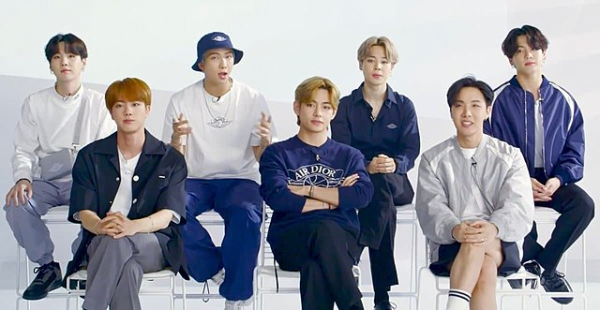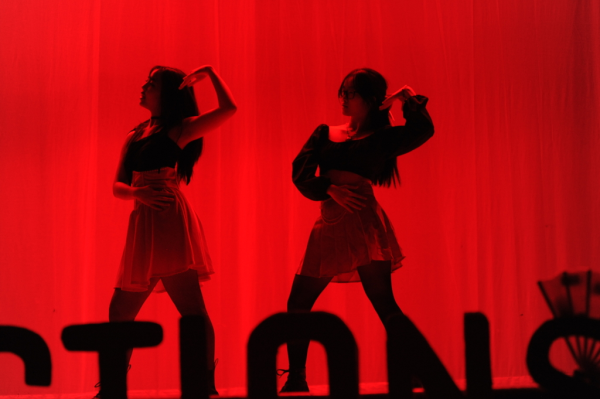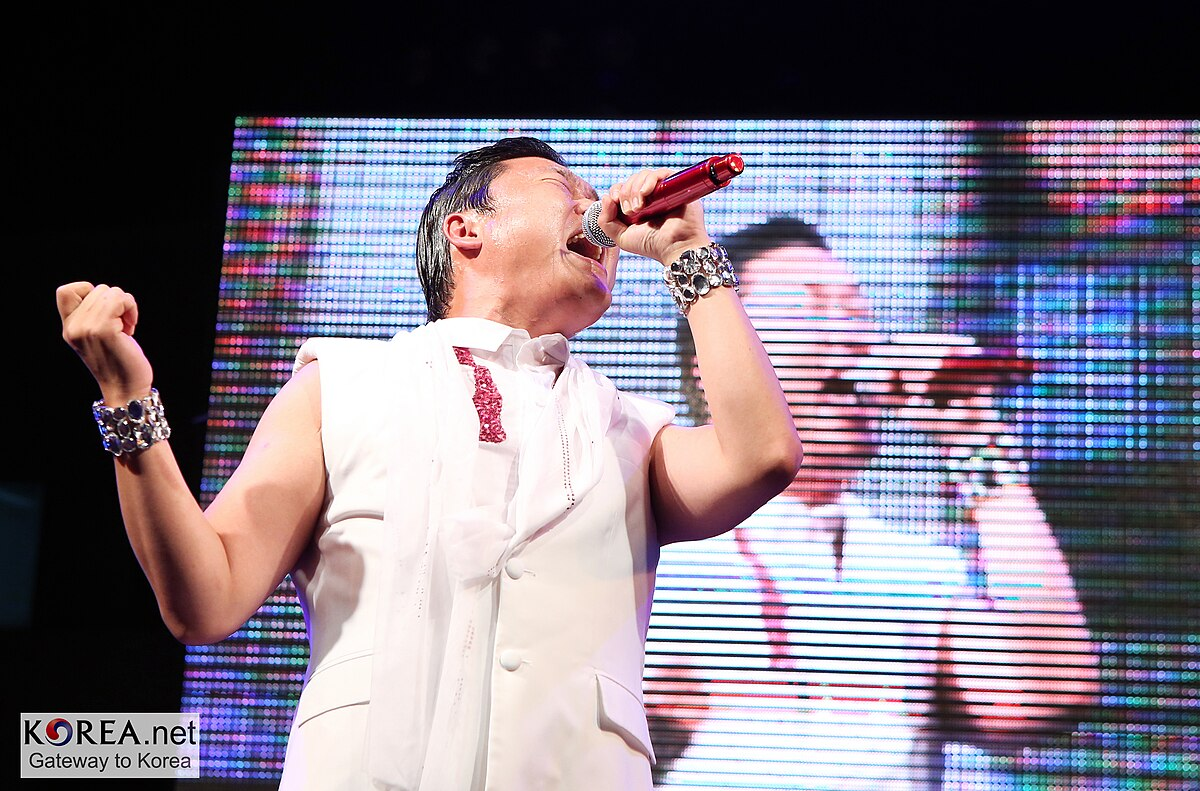Your breath is gone as your hoarse voice screams out in recognition of your favorite tune starting to play. Your eyes are glued to the lit-up stage, making out the familiar figures through the pink lightsticks. The figures are dancing, their arms moving but their eyes convey a fierce determination to sync every movement. No matter what, you can’t seem to break away.
It’s easy to find yourself drawn into the perfectly choreographed world of K-pop.
The K-pop you see today has come a long way since its beginnings. South Korean popular music (K-pop) is a large part of South Korean culture today and can be characterized by its focus on choreography, groups, and the rigorous idols training.
Evolution of K-pop
On April 11th, 1992 Seo Taiji and Boys performed on TV and the first K-pop group was born. Seo Taiji and Boys were part of the first generation of K-pop. Their appearance drove the establishment of SM entertainment (1995), JYP entertainment (1997), and YG entertainment (1998). These companies dominate the K-pop industry today. Acting as an inspiration to all those that followed. Seo Taiji and Boys and the subsequent groups that followed dominated the music scene in Korea by blending hip hop beats, rock, and rap elements with traditional Korean music. This is known as the first generation of K-pop (1992-2002).

The second generation (2003-2012) was part of the Hallyu (Korean Wave), a period of rising global popularity in South Korean pop culture, T.V. shows, dramas, and music. During this generation, the term K-pop idols, meaning an entertainer extensively trained in singing, dancing, and performing, was popularized. Idol can also refer to the upbringing of the artist, as the companies recruit as early as 8 or 10 years old to become a “trainee.” The Hallyu marked the start of the globalization of K-pop music. Their generation is characterized by their elaborate, synchronized music videos and captivating beats. This aspect of synchronized dances is still used today. Its a tactic named “자리바꿈” (jaribaggum), or “formation changing” in English, where idols change positions throughout the routine.
The debut of EXO in 2012 and BTS in 2013 took the world by surprise, and led to international fame for these young idols. This generation (2012-2019) is known for the hit song released in 2012 that made over $20 million – “Gangnam Style ” by PSY. The famous, chaotic music video hitting over 5 billion views on Youtube as of 2024 had people around the world doing his iconic dance. This ties back to rise of another important aspect of K-pop called “포인트 안무” (pointeu anmu), or “point dance.” Dances, like the one featured in PSY’s music video, are made to be addictive and repetitive, encouraging fans to learn their routines. These dances helped increase the popularity of K-pop. PSY’s rise to fame was alongside BTS, EXO, BLACKPINK, SEVENTEEN, MAMAMOO, Red Velvet, and TWICE. BLACKPINK was the first K-pop group to perform at Coachella during 2019 and recently came back to perform during 2023.

Their generation saw the rise of social media (X, Instagram, and Youtube). Their songs about self love, mental health, and romance took off around the world, most notably the United States. It is said that “Gangnam Style ” showed K-pop’s potential, and BTS lived up to it, making it in the US. Among the many groups listed and created in this generation, BTS stands out as the most popular group. BTS stands for “Bangtan Soneyondan” (in Korean) and “Bulletproof Boy Scouts” (in English). I can’t seem to put into words the charm of their members or the reason for these boy scouts’ overwhelming popularity.

The 2019 debut of ITZY and TXT marked the fourth generation (2019-2023). Among these two groups are STRAY KIDS, IVE, ATEEZ, and ENHYPEN. During this generation it became more popular for members of a group to go solo alongside their group activities. As the majority of this was during the COVID-19 pandemic, virtual concerts and online fan events were popularized. During the COVID-19 pandemic, Tiktok gained popularity, and with Tiktok came dance challenges.

The fifth generation that arguably started in 2023, is currently underway. It’s still early in the generation, but groups to look out for include BOYNEXTDOOR (BND), Kiss of Life, and TWS.
K-POP Today
Today, K-Pop idols are closely monitored in every aspect of their lives. Many idols are forced into plastic surgery (most commonly, rhinoplasty) prior to debut. Their diets are monitored and some are required to undergo “weight management.” A singer from TWICE, named Momo was infamously told to lose 7 kg (15 lbs) prior to debut. She ate one ice cube each day, worked out at the gym, and then spat out the water everyday for an entire week. Momo ended up losing the required amount of weight before gaining the weight back the following week. Her relationship with food has improved since then. Legislators have passed laws aiming to protect the young entertainers. The landmark law called the Ordinance on the Protection and Supports of the Rights and Interests of Young Cultural Artists was passed in Seoul to protect the rights of aspiring trainees from physical and mental harm (specifically forced weight loss or plastic surgery).
The control of employers doesn’t stop there. Agencies prohibit their idol employees from dating at all. While the no-dating rule is certainly enforced, there are still plenty of idols who have dated or are dating. Their relationships are mostly heterosexual. It’s no secret that dating as a celebrity is complicated to say the least. As a result, most idols that date keep it out of the public eye, or keep their partners anonymous.
The world has changed since Seo Taiji and the Boys made their debut on T.V., and it’s no secret that the youth demographic is changing. Every generation creates a new norm, adapting to the time and age it was born into. A big difference between the older and younger generations is LGBTQ+ rights. South Korea doesn’t prohibit homosexuality but hasn’t passed anti-discriminatory acts. A few idols, singers, and entertainers have come out as gay or bisexual. In 2020 an openly gay idol, Holland, was attacked for being gay. When he filed the charges, it was under assault because it’s not legally considered a hate crime. Holland is just one of eerily similar stories about facing hate crime in Korea as an entertainer. But the idols coming out are not among the great superpowers (such as BTS), no major idol has openly stated they are. Despite this, many fans have made speculations. There have been plenty of rumors about many members of BTS (and other groups) hiding their sexuality.
The Meaning of K-POP
However, is this really what Korean music looks like? The majority of the Koreans that live in Korea actually prefer ballads to the upbeat music of groups like BTS. Recently, lesser known groups in Korea that claim to be “K-Pop,” are actually branching away from this. Groups like Balming Tiger are trying to create a new image of K-Pop. They don’t claim to be idols, they simply say they are attractive because they are imperfect, a drastic difference to the perfectly crafted image of idols. As Kaitlyn Toy’26 said,”…any music can evidently be considered as part of K-pop … as long as it is, well, popular.”

In Bronx Science, K-pop has been celebrated by the Lunar Productions club. Some members of the club learn the original choreography released from the idols themselves, and perform the routines at various celebrations throughout the year. Others participate by singing or helping backstage. One active member named Rebekah Chen ’26 said she came to support a friend and since has “come to a liking for dance.” Lunar performed ‘Drama’ by Aespa and ‘Cool with You’ by NewJeans for an April 2024 celebration at Bronx Science.

K-pop truly is for everyone, and you don’t need to speak Korean to enjoy their music. As Chen stated, ”Although I’m not Korean and can’t understand most of the lyrics, I like the music style and variety of groups.” If you do feel the need to know the meaning behind each lyric, there are online translations for each song.

K-pop has created unity. It has fueled and facilitated the spread of Korean culture not just to the U.S., but also to places in South America, U.K., places in Asia, and countries all over the world. Whether you are an avid listener, a pledged member of a fan club, or just like one song, you can appreciate the sheer amount of people their music has touched. It has not only created unity, but it has also created another avenue for activism. Idols today aren’t afraid to voice their political opinions. In fact, BTS loosely quotes Martin Luther King Jr. in their song “No More Dreams,” their critique on today’s youth.
Above all else, it’s clear that K-pop is shouting from the rooftops, “I’m here!” And I am proud and happy it is. A lot of K-pop is made up of songs to remind people to love themselves. It is clear to me that the idols sing for everyone who needs a little love.
Although I don’t know Korean, when BTS’s Jin sings his famous lines in “Magic Shop”…
“내가 나인 게 싫은 날 영영 사라지고 싶은 날
On a day you hate being yourself, on a day you want to disappear forever,
문을 하나 만들자 너의 맘 속에다
let’s build a door in your mind
그 문을 열고 들어가면 이 곳이 기다릴 거야
Once you open the door and enter, this place will wait for you
믿어도 괜찮아 널 위로해줄 Magic Shop
It’s okay to believe Magic Shop that will comfort you”
I can’t help but smile.
A lot of K-pop is made up of songs to remind people to love themselves. It is clear to me that the idols sing for everyone who needs a little love.

